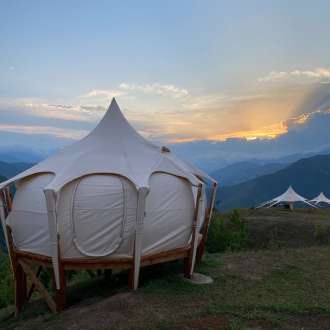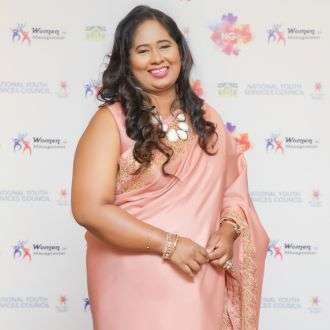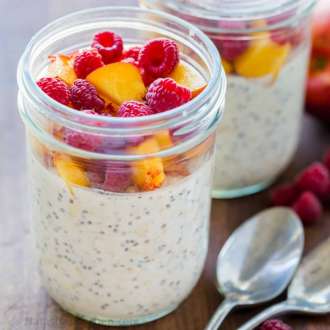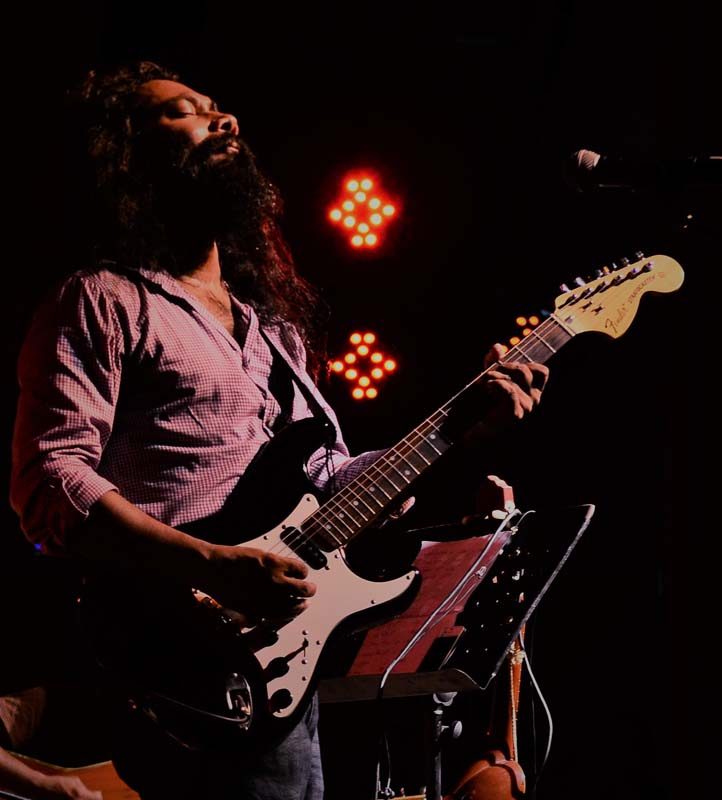
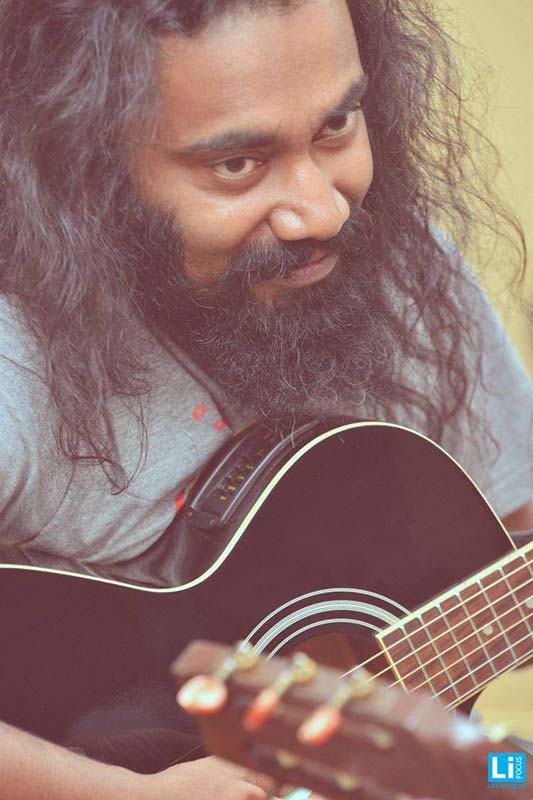

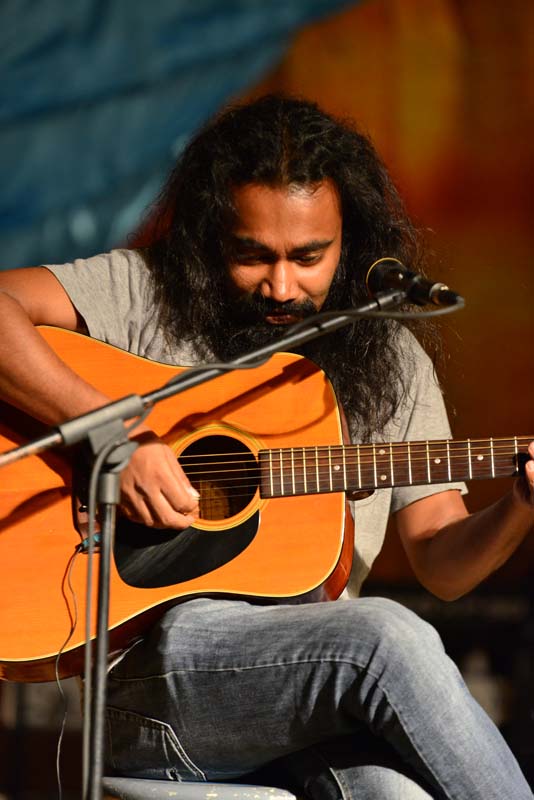
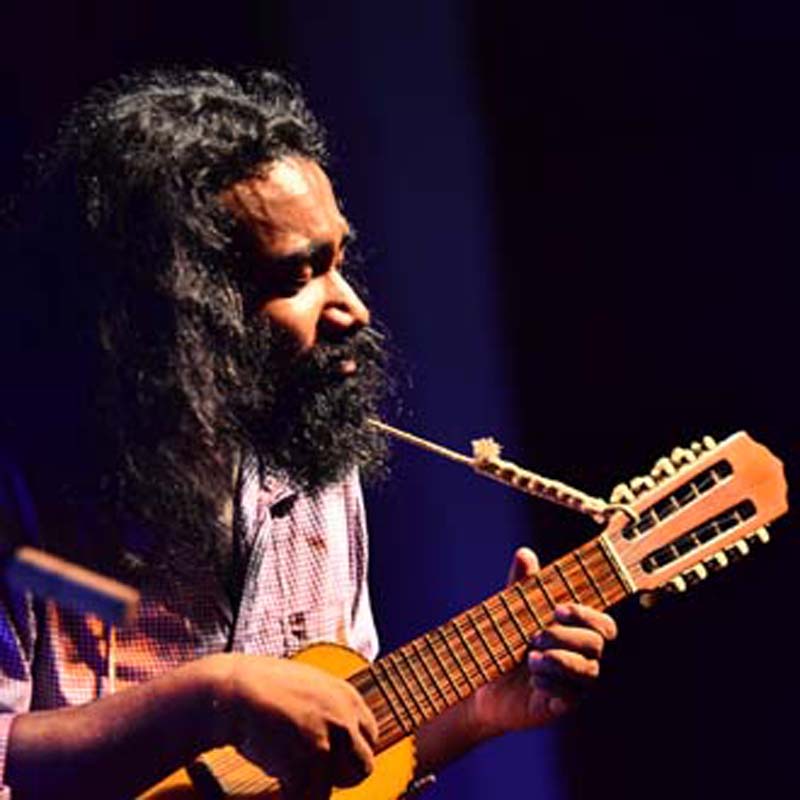
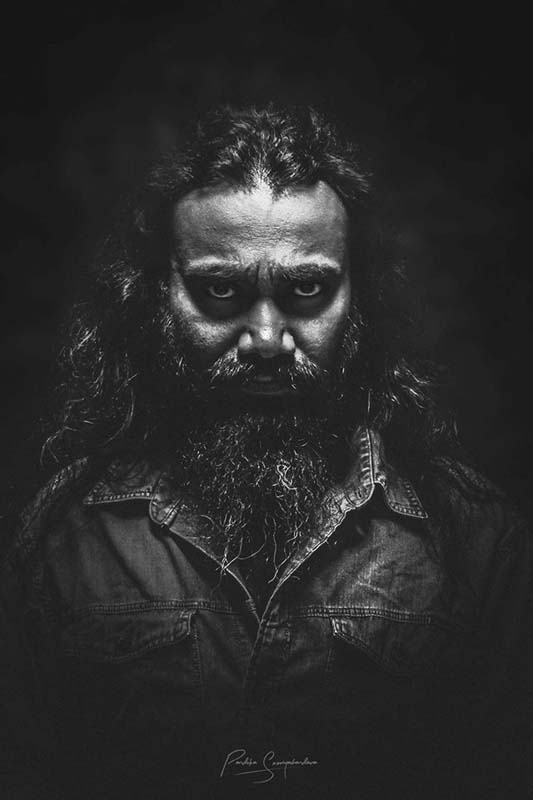
Nadeeka Guruge is a man of great depth and profound insight who has captured the respect of his audiences both in Sri Lanka and abroad. We chatted to Nadeeka in a heart-to-heart interview and here is what he had to say:
It feels great to know that people finally understand me!
In my early life, my parents with their diverse musical taste influenced me at home. I came from a musical background with everyone singing and playing the guitar. The whole household could sing in my family. Music grew within me over time and became second nature. I started playing the guitar at the age of 14 and my brother gave me my first lessons.
Well, I started writing lyrics whilst I was at school, and later at the age of 21, I went ahead and composed folk fusion music with a Bolivian artist, Marcello Titto Li. We produced a CD and that was the beginning... my first recorded music!
I was greatly influenced by the late Premasiri Khemadasa also known as the “Khemadasa Master” who was one of the pioneer composers in Sri Lankan musical history. Also, Maestro Sunil Shantha and popular singer Clarence Wijewardhane, but there were many others who affected my way of thinking about music, understanding why we have such a polarised musical culture in Sri Lanka and also recognising the mathematics, logic and colours and musical notes. For instance, J.S. Bach has been a great influence on me when it comes to film scoring and instrumental compositions.
I'd also add that Victor Jara, the Chilean singer-songwriter, had an effect on me both ideologically and with the technical aspects too.
In the past, it was street performances when we started setting up “pop concerts” almost like street drama and started singing. Most of our original songs were about social justice and issues concerning our society. We spoke about sexism, racism, the circle of life and the joy of life through our creations.
A little later as we gained some recognition, we were invited to perform at universities and various events to perform and talk about issues in our society. At that time, we were singing about the war, our taste in music and also the huge influence of Indian musical culture. I tried to introduce my audience to our folklore and some of the original classics, as well as modern trends which especially became popular in the '70s with international social movements.
At present, I have a large loyal fan base from ages 8 to 80 years old. This is because I compose and sing, and make a great effort to speak a language that relates to everyone at each performance. There is a mixture of professional, educated and less educated fans that follow me, of both genders. International crowds and members of the Sri Lankan diaspora are also following me, talking to me and enjoying my music.
As I stated earlier, this was my first serious and most passionate musical experience. From the lyrics to composing, to playing and singing, there was a lot of emotion involved. It was unique but unfortunately, at that time, no record producer wanted to invest in the CD and had doubts whether it would sell, even though everyone agreed it was good.
The simple answer to that is “yes” and “no”.
“Yes”, because I grew up in a middle-class setup and from my childhood, I could see institutional injustice. It did have a strong impact on me as it was harder to achieve what I have today in terms of recognition. We live in a society with so many taboos, so many perceptions that are beyond our control. For example, the school you attend, where you come from and the pedigree of your parents make a huge difference when you enter into the entertainment industry. I guess it's everywhere. I had to battle so much as a young man in a judgemental culture because of my appearance, the way I talk and my no-nonsense approach... I was a guy full of energy and ideas.
“No” because I've never changed the way I think, talk or write, play and sing. I'm the same! I think the same but I still have the same battle encouraging people to think about their actions, the way they think, treat each other and how we should evolve as a decent society.
Throughout my career, almost every creation of mine reflects the dynamics of the society in one way or another. My way of seeing and re-interpreting the “world” hasn't changed during this period of political sensitivity. However, I believe that music itself doesn’t make people realize what society needs at this very crucial time. So I decided that I should become involved in politics.
When I speak in support of a certain political party, as is known, I support the ideology and policies of “National People’s Power”. Some people criticise me and ask me to support their favourite candidate instead. Others appreciate me for supporting this ideology. I think the influence of my music is explained there. The impact I have made has either led to disappointment or appreciation but still, my fans are with me. That’s beautiful and I feel humbled by this experience.
Definitely, “Luhu Bandinna Maa”. I composed it in 2007 when I was in Geneva with my wife and my elder daughter. It's a “Political Folk Song” and it carries an important political meaning. The lyrics say it all...“Chase me... Chase me... But a bullet cannot erase a memory”
Another favourite (I know you said one) is “Bluesy”. It's catchy and groovy so the crowds could easily get into it.
Folk music is relevant to us all the time. That’s why despite its unwritten traditions, it has been brought forward through the culture and ethos of our lives, and generations of folk music still lives on.
I believe that a composer should be able to bring out the colours and the shapes of a simple folk melody that its creators haven’t seen. For example, we have numerous types of Folk melodies in Sri Lanka. “Pan Neleema” (Wedding Song) is one of those Folk songs. I improvised the melody with four male voices including Bass, Baritone, Tenor and Countertenor. On another occasion, I composed a piece of music based on “Bambara Kavi” which is a type of folk melody, sung by those who harvest beehives in the jungle. I wrote the piece for a piano and a choir, and I needed to highlight the sound of the bees and the sympathetic way of looking at the loss of the bee community.
Blues music is all about the depth in simplicity to me. It has the same dynamics of our day to day lives. It’s all about freedom and less structuralism. You can just express yourself unconditionally in “Blues mode” as there are no boundaries in it, unlike Classical or Jazz.
I don’t enjoy acting at all. It's good to experience it once and then that’s it. However, the film “KARMA” that I acted in was very special to me. It was almost like the time when I went through the struggles that I needed to accept that unconditional love and marriage have deep consequences. The director and writer of the film saw this struggle that we went through as a family and wrote the script.
Um, the first half of my career was a period of struggle as I had to prove myself because the traditions I introduced were completely different from what there had been. But I admit that even at that stage of my emergence, I was appreciated and encouraged by a few people including my girlfriend back then who is now my wife.
Within half a decade, I gained the attention of pioneer film-makers in Sri Lanka, including Dr Dharmasena Pathiraja and slowly my music was heard on the screen, in theatres, in Pop culture and so on. So, the rest of the story everyone knows.
No, not really, but I did start writing about music. I launched my first book last March which was an analysis of Clarence Wijewardhana’s music, who is a well known Sri Lankan pop icon. Three other books are ready to be launched next year which are also music analyses.
The songs of Paul Simon and Art Garfunkel always inspire me, especially Paul Simon’s lyrics which have helped me to see things differently. World Music always inspires me. I also enjoy listening to music from a range of tribal music up to certain classical composers especially J.S. Bach.
It has changed tremendously. Newcomers have so many platforms. However, although technology has made better production easier, I see a lack of creativity because of these technological influences. We need to be mindful that anything can be created and made through the computer, but human feelings should be heard through actual music rather than sounds and beats.
Unplugged concerts. Mistakes. The real-time singing and playing. Yes...
The rhythm and the harmony of music and the thought.
Reading, eating and sleeping.
Our readers and fans can connect with you here:
www.nadeekaguruge.com
https://www.facebook.com/Guruge.Nadeeka/
https://www.facebook.com/NadeekaGurugeMusicAcademy/


